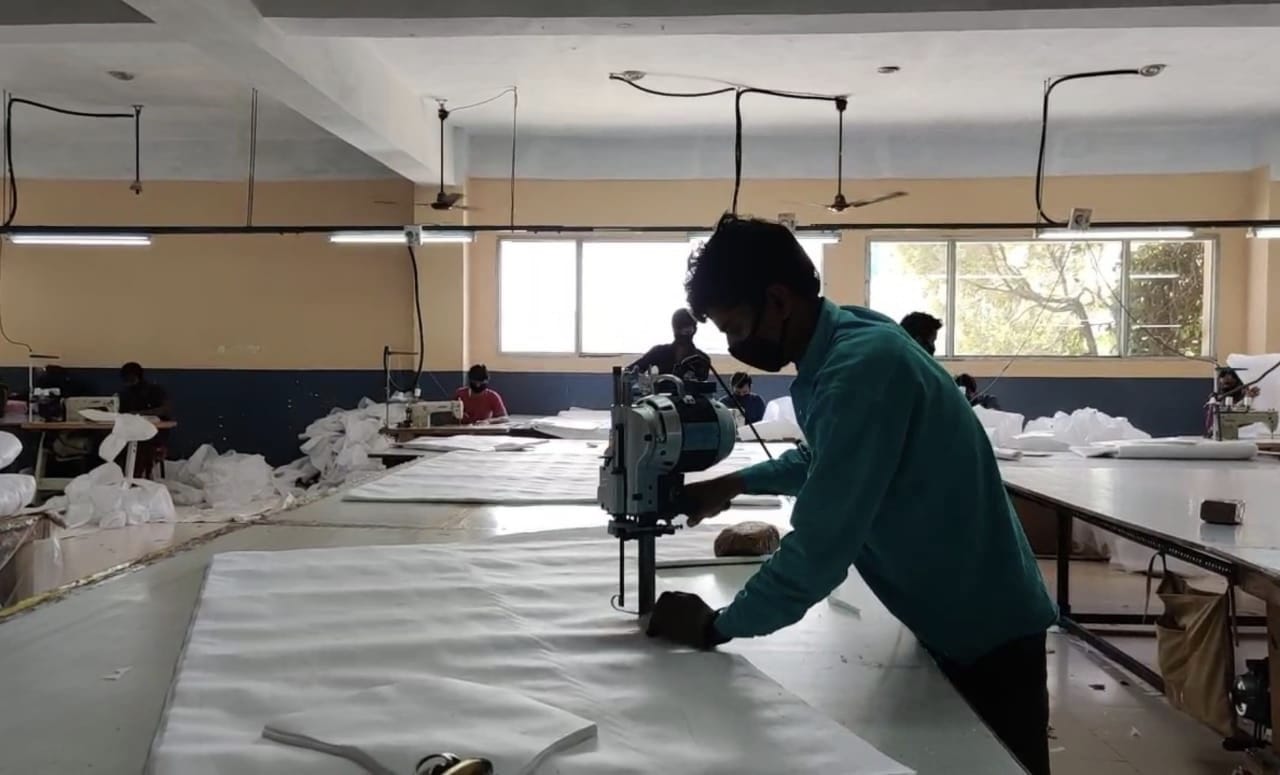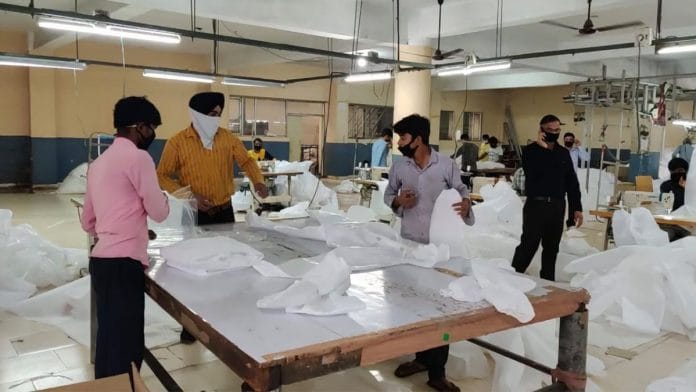Ludhiana: A bumpy road and numerous small-scale shops with downed shutters lead the way to the factory of Youngman Blankets in the sleepy Ludhiana village of Seera.
Youngman Blankets traditionally produces blankets but ever since the Covid-19 pandemic, its factory, some 30 km from Ludhiana town, has done its bit to help frontline workers battling the coronavirus pandemic across the country.
The company is among eight in and around the textile hub of Ludhiana that have been manufacturing personal protective equipment (PPE) for healthcare workers.
“It is the need of the hour. Our frontline health-workers are working so hard and they need all the help they can get. We are doing our bit,” says Ramesh Jagota, managing director of Youngman Blankets.
The change in business strategy has been working, The eight Ludhiana firms are among the nine in Punjab that have bagged PPE orders worth Rs 200 crore from the central government.
It has also helped Ludhiana, known for its hosiery and bicycle production, address a major problem brought on by the nationwide lockdown — unemployment.
The unemployment rate in India crossed 23 per cent in the last week of March and first week of April — the highest it has been since 2016 — but the factories in Ludhiana say they have been able to keep at least a part of their labour.
“This has definitely created employment opportunities for the labour in our factories,” says Amit Jain, managing director of Shingora Textiles, another of the Ludhiana firms manufacturing PPEs.
Also read: Most Muslims in Punjab’s Malerkotla have Tablighi link. But that’s not their big Covid worry
The making of a PPE suit
At Seera village, the Youngman Blankets’ factory opens with a large, well maintained area. There are 69 employees at work, from the guards to the labour, all of whom are wearing masks.
Ample precautions are being taken with temperature-checks right at the main gate and anyone entering with even a slight fever is turned back.
Managing director Jagota told ThePrint that the firm applied for permission with the Punjab government to make PPE suits on 23 March. The request was approved for between 29 March and 14 April but has since been extended till the end of the lockdown.
Jagota says they have bought five new machines — which cost a total of Rs 5 lakh — to help ramp up production and the equipment is expected to arrive by next week. The PPE suits are sold at a price of Rs 600 per suit to approved traders.
“Our capacity is for 3,000 PPE suits per day but we are making 1,100 a day as of now,” says G. S. Bajwa, the general manager of operations. “The aim is to make 7,500 PPE suits in a single day.”
The factory has 46 sewing machines, each of which can generate 30-35 suits a day depending on the level of skilled labour. It takes about 45 minutes to complete the tailoring of one full suit.
At the shop floor, tailors Sanjay Kumar and Safiq Alam sit opposite each other but with plenty of distance between them and separated by white fabric used for the suits. They both work eight-hour shifts a day, from 9 am to 6 pm, earning Rs. 18,000 a month.
The company has also arranged lodging and food for the employees. Anand Bardhan, head of HR explained, “They are fed thrice a day in the canteen and have been taken care of completely.”
Kumar, who has been working here as a tailor for over two decades, doesn’t stop with the sewing machine even as he speaks to ThePrint. “When we come in the morning, we sanitise our hands properly and then clean our machines as well. We repeat this practice around five times in a day,” he says.
Since the factory traditionally makes blankets, the tailors were put through basic training in stitching suits. “The problem is that the fabric is very delicate, so we have to be careful so as to not tear it,” Alam told ThePrint.

The disposable PPE suits are made of non-woven polypropylene fabric, while the reusable ones are made of woven polypropylene fabric.
Once the suits are stitched, they need to pass quality tests.
At the busy ground floor of the factory, Jatinder Singh, the quality manager, says the process begins even before the fabric reaches the factory. “First and foremost, the fabric used and a trial PPE suit must pass the test set by SITRA (South India Textile Research Association) in Coimbatore,” he says.
While Youngman’s fabric has already passed this test, they conduct a penetration test of their own in their private laboratories. Once approved, the fabric is layered, a pattern is put in place and it is cut using a manually operated machine. It then goes to the tailor.
“While stitching, it is important to ensure that the seams are very close to each other so as to avoid penetration of anything. It is then checked to ensure that it is wearable, free-movement is allowed, and elastics around the wrist are tightly secured,” Singh told ThePrint.
As he walked us through one step to another, Singh explained how the suits lack any seams around the shoulder in an attempt to cut tailoring time but also because fewer seams mean lesser chances of any substance penetrating.
The suit is then packed in a poly bag, sealed, put in boxes and shipped.
Also read: How Punjab kept its farm economy going and brought Asia’s largest grain market back to life
Need for reusable suits
Amit Jain, the managing director of Shingora Textile, shed light on another important matter. “We make two kinds of hazmat suits — reusable and disposable ones,” he said. He pointed out that when the pandemic comes to an end, the government will be faced with a major problem of disposing used hazmat suits. The reusable hazmat suits can be auto cleaned and reused up to 25 times in a hospital.
Jain began brainstorming long before any of his contemporaries and 10 days before the lockdown. His Shingora Textiles — a shawl and scarf manufacturing factory, founded by his mother 20 years ago — had already begun working on a fabric that could pass SITRA tests even before the lockdown.
“It’s not physically possible to manage everything in one factory, which is why we have got permission to use five other units. Our production capacity was 500 pieces a day for the first 10 days, but we have ramped it up slowly and by next week we’ll be making 5,000 pieces per day,” Jain told ThePrint.
His suits are bought by Hindustan Latex for Rs 635 each. While Jain refused to delve into details, he said they also provide the equipment to leading private hospitals in Delhi and Punjab.
“For us, this was never a business opportunity, we just wanted to help. We are very focussed with what we do and want to do the best we can,” Jain told ThePrint.
But for all of their efforts, Ludhiana’s firms are just a drop in the PPE ocean.
A substantial part of India’s PPE kit supply comes from China. As of 14 April, India placed an order for “15 million PPE kits, including gowns and masks, and 1.5 million rapid testing kits from China”.
Also read: 5-day break for staff, proper kits — how Punjab hospital is handling Covid-19 in hotspot






